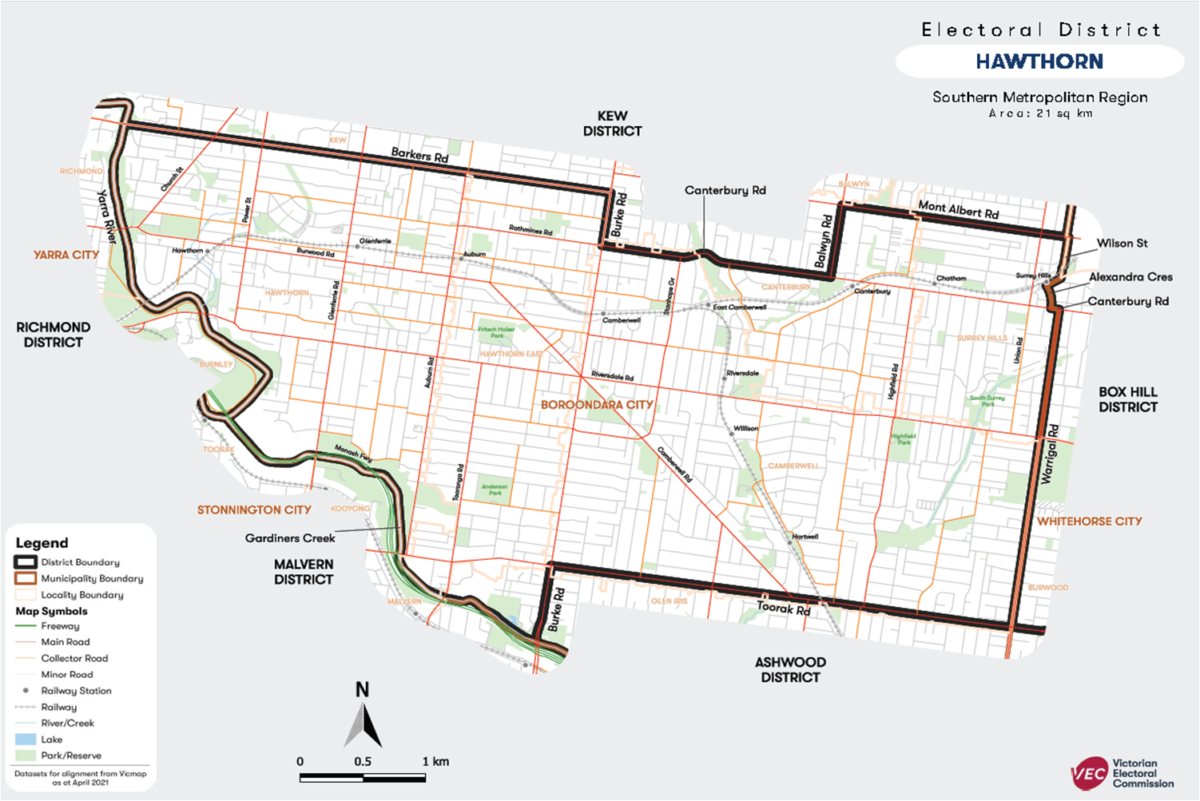Hawthorn: Show climate action is your top issue

Why Vote Climate One thinks Hawthorn is a key seat
In the Victorian election, Labor, Liberal and Green parties plus a ‘teal’ independent are contesting the seat of Hawthorn on climate.
From Vote Climate One’s perspective, how candidates will respond to the present climate emergency is an existential issue. For us, it is the only election issue that really matters.
If we don’t stop and reverse global warming, our carbon emissions and the accelerating global warming feedbacks driven by emissions will drive our planetary climate system into a Hothouse Earth within a century or so (a geological instant of time). Much of Earth’s surface will become too hot for humans and most other large and complex species to survive because the change will be far too rapid for slowly reproducing organisms to adapt. If our elected governments fail to solve the climate crisis, there will be no civil society left to worry about any other issues the government we are electing in November might or might not have solved.
Where the election in Hawthorn is concerned, clear choices exist: The incumbent Labor Party retiree pushing Labor dogma (including support for new and extensive fossil fuel production projects); a vigorous Liberal Party progressive and previous MP for Hawthorn still tied by Party discipline to Party’s anti-scientific support of its fossil fuel patrons; a young Green who should be trusted to follow the Green’s strong Party line on climate; and a mature ‘teal’- colored community independent who is strong on climate and very well qualified to be in Parliament.
The 29 October Age, provides a comprehensive review of the District and these candidates by Clay Lucas in his article “Will Hawthorn go back to blue, remain red or could teal lightning strike again?”

The following links will take you to these candidates websites: John Kennedy (Labor incumbent); John Pesutto (Liberal); Melissa Lowe (Green Light Independent); Nick Savage (Green). Two other candidates not surveyed by the Age are also running: Faith Fuhrer of the Green Light Animal Justice Party who is a communications consultant concerned about animal welfare; and Richard Peppard of the Red Light Liberal Democrats (from the linked candidates’ page you will then have to use your browser’s search function to find “Peppard”). Peppard is a neurologist claims to value “science, the environment and good values”, but is staunchly anti- Labor, Greens, and teal independents, thus clearly following the Lib Dem’s libertarian point of view.
How does our Climate Lens Traffic Light Assessment deal with these alternatives.
In this contest, it is highly likely that the seat will be decided on the basis of preferences. If you are concerned about government support for action on climate change, how you manage your preferences may be critically important.
If you accept that effective climate action is really the only issue that really matters in today’s circumstances, you should vote [1], [2], and [3] for the three Green Light candidates.
In this electorate we recommend [4] and [5] for Kennedy and Pesuto. Although Labor policy is consistently better than the Liberals, the Labor Party is marked everywhere with Orange Lights, because Labor’s policy supports their fossil fuel industry patron’s continued growth in terms of opening large new production projects. Liberals and Nationals are marked with Red Lights in most electorates’ but in Hawthorn we give Pesutto (Liberal) an orange light. On a number of grounds (as discussed in the Age article) he seems to be a better choice to be elected than many of his Liberal colleagues contending for other seats. Thus if you are voting climate first, Kennedy and Pessuto are ranked [4] and [5].
(If you are a ‘rusted on’ liberal and intend to vote [1] for Pesutto, but still concerned about climate you should rank our our Green Light candidates [2], [3] and [4]. This gives you three chances to support election of someone who can be counted on to give their full support for climate action before Labor and/or Liberal. Similarly, if you vote [1] for Labor, you should also rank our Green Light candidates [2] – [4].
All Liberal Democratic candidates are marked with Red Lights wherever they are running because of the Party’s libertarian stance against Labor, Greens and teal community independents because these candidates accept that governments will have to be heavily involved if climate action is to be effective. In Hawthorn, Peppard has clearly expressed his allegiance to this anti-government policy, so that puts him last [6] in the preference list.
Hawthorn should be an interesting bellwether seat to follow in terms of support for strong climate action.
Finally, you may also be interested in our Traffic Light assessments for the Upper House in the Southern Metropolitan Region (in which Hawthorn District is included).